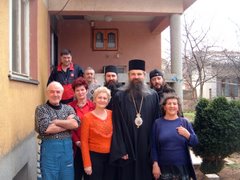UNMIK Official Mislead Public On Illegal Activity Near Decani Monastery
KIM Info ServiceDecember 28, 2006
Following yesterday's statements by UNMIK spokesman Neeraj Singh that there is no illegal construction in the UNMIK-defined protected zone around Visoki Decani Monastery and that claims of such construction are not based on fact, the administration of Visoki Decani Monastery issued a communiqué, which the KIM Info Service is forwarding to all media.
COMMUNIQUE
Decani, December 27, 2006
It is with great surprise that we received the statement of UNMIK spokesman Neeraj Singh who, according to Beta news agency, stated that "claims of illegal construction in the protected zone around Visoki Decani Monastery are not based on facts" and that the protection of cultural heritage is "one of the highest priorities for Kosovo institutions".
According to Singh's statement "every construction project in this zone is deliberated by local authorities by permission of the Ministry for Spatial Planning and Environment" and adherence to the provisions for the special zone is supervised by a special local committee, which approved three requests for economic and other projects.
Unfortunately, this statement by an official UNMIK representative not only rationalizes and covers up the fact that UNMIK executive decisions regarding the protected zone around Visoki Decani Monastery are being openly violated but also gives a completely warped picture of the actual situation in the municipality as well as with respect to Serbian spiritual and cultural heritage in Kosovo and Metohija as a whole. Therefore, we are forced to present several facts which demonstrate that the UNMIK spokesman is either unconsciously or intentionally deceiving the public, which does not contribute in the least to the resolution of existing problems and the establishment of an atmosphere of trust and confidence.
1. An official Kosovo police document dated December 9 confirms the violation of the executive order regarding the protected zone. The conclusion of the report, which is signed by the local police chief, Police Captain Bekim Avdijaj, and prepared on the basis of a complaint filed by UNMIK representatives for the district of Pec, Mr. Luis Perez, states:
"This case is evidenced case in violation of the Executive Decision of SRSG, for the Special Zoning Area. All necessary measures and procedures are undertaken regarding this violation. Case is completed and referred to competent Prosecutor’s office for further proceedings."
Unfortunately, the fact is that police undertook nothing and this illegal construction continued and was finally halted only after an intervention from the UNMIK leadership a few days ago after construction of the building was already completed.
2. UNMIK chief Dr. Joachim Ruecker spoke by telephone a few days ago with Visoki Decani Monastery and conveyed his firm assurances that illegal activity would be halted. The UNMIK chief also said he would be visiting the monastery in the near future.
3. The monastery received a visit today from representative for political and economic issues with the U.S. Office in Pristina, Mr. Tomas Yezdgardi, who upon learning of existing problems and plans for further illegal construction in the protected zone visited Decani municipality to speak with the mayor. Yezdgardi conveyed the firm position of the U.S. Office that UNMIK decisions must be respected, and that the illegal construction is unacceptable.
4. Finally, confirmation of illegal construction was given to Beta news agency on December 26 by Decani mayor Nazmi Selmanaj himself, who confirmed that "the municipal inspection has interrupted works being done without a license by a private businessman in the protected zone around the monastery, and it has ordered the building destroyed".
These four facts clearly speak about the problem of illegal construction, and the question really must be raised on the basis of what facts and in whose behalf the UNMIK spokesman is giving irresponsible and inaccurate statements to the press.
With respect to Singh's other claims, we feel it is necessary to explain that decisions about construction work in the protected zone, according to the executive order of the UNMIK chief, are not being considered by local institutions nor by the Kosovo Ministry for Spatial Planning but exclusively by UNMIK. According to existing legal provisions Kosovo institutions do not have the ability to make any sort of decisions contrary to the executive order of the UNMIK chief. Despite this, Decani municipality chose to ignore the illegally constructed restaurant where representatives of the municipality were regular visitors. Moreover, although informed about the expansion of the illegally built building in timely fashion, municipal officials again did nothing until pressed by international authorities. It remains to be seen whether the decision to remove the illegally constructed building as the mayor promised in his statement will actually be done.
By order of the UNMIK chief a local committee was formed to implement the protected zone around the monastery which includes representatives from UNMIK, the monastery, the municipality, the Kosovo Police Service and KFOR. The committee has only met once so far because for the past two years the municipality has been avoiding putting up signage marking the beginning and the end of the protected zone. The monastery has not approved any construction within the protected zone. Mr. Singh was probably thinking of one instance of using gravel from the river and two instances of controlled use of firewood from privately owned lots in the zone, none of which represented a threat to the environment or the monastery and UNMIK representative Mr. Perez approved in informal communication.
As far as the idea of a highway toward Plav Lake (Albanian inhabited part of Montenegro) and the construction of a mineral water factory by an Arab-Albanian company, the monastery has not given any sort of approval for this. Moreover, it is the firm position of the monastery that according to UNMIK regulations such activities are not legal, and that any sort of construction of highways and factories in the protected zone is unacceptable and represents a danger to the monastery and the natural ambiance. The unrelenting determination of the municipality to push these projects through without consulting with the monastery and contrary to UNMIK decisions shows that Decani municipality is obstructing UNMIK decisions, and the monastery has already informed diplomatic representatives in Pristina and the office of Mr. Ahtisaari in Vienna of this problem. The municipality's insistence that all industrial activity in the municipality be developed near the monastery has a clear political agenda with the goal of making it impossible for the monastery, the only Serb community on the territory of the municipality, to function normally.
The further attitude and handling of this and similar issues by Kosovo institutions will be a direct test of the sincerity of Kosovo representatives officially claiming that the protection of the heritage in Kosovo is their priority.

















